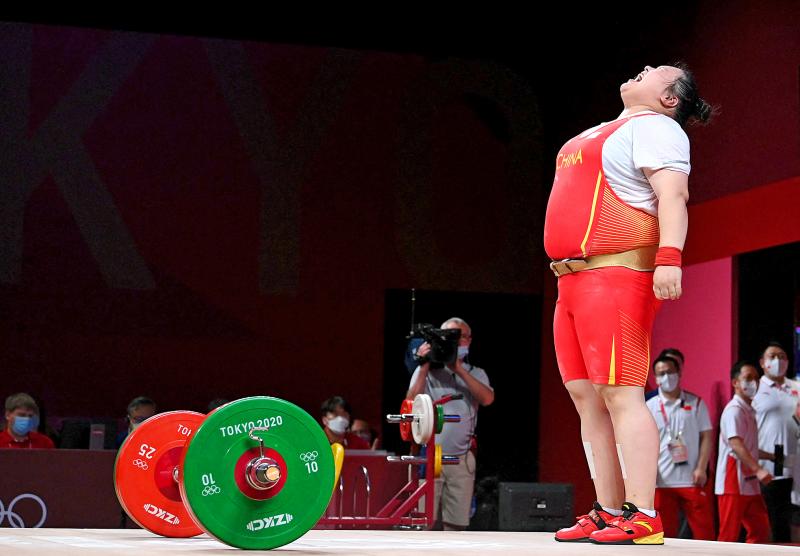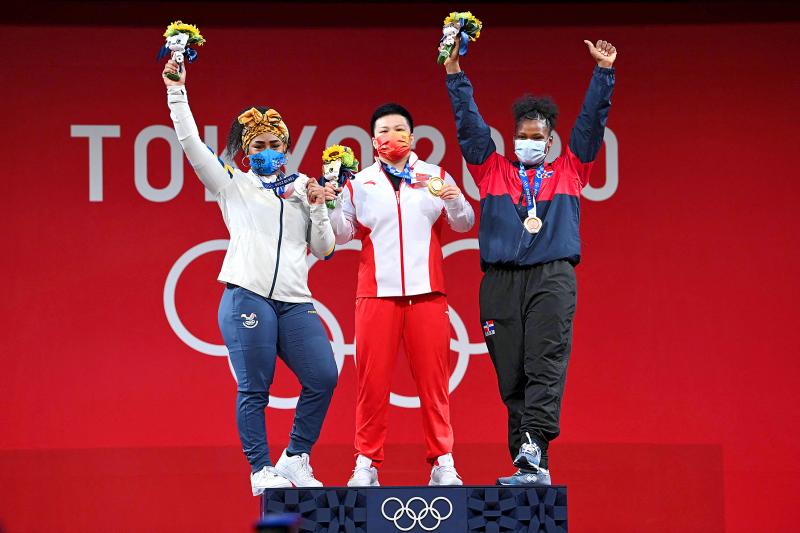In a Shanghai basement gym, amateur weightlifters strain under two loads: the steel bars and plates that they lift, and a stigma rooted in the Chinese belief that the sport leaves its practitioners stunted and fat.
Even as China once again dominates weightlifting at the Tokyo Olympics, amateurs back home face misunderstanding.
“You see athletes with big butts, big legs, red faces, lifting on the platforms at the Olympic Games,” said Gabriella Qu, founder of Venus Weightlifting in Shanghai. “That’s the moment people say, ‘That’s not very nice. That’s not the image I want to put on myself.’”

Photo: AFP
Especially for women practitioners in China — where physical beauty is typically equated with slender fragility — weightlifting is strongly looked down upon.
Xu Weiya, 28, who was inspired to start lifting by her husband, a competitive amateur weightlifter, said her parents had “a lot of comments” about her new hobby.
‘NOT FOR YOU’

Photo: AFP
“My mother said to me, weightlifting athletes are all short and buff, so this sport is not for you,” Xu said, citing a commonly held belief that “girls shouldn’t do this type of exercise.”
Qu, 32, a weightlifter and coach herself, says she opened Venus Weightlifting in 2015 partly to help address such misconceptions by increasing awareness of the sport as a form of healthy exercise.
China — currently racking up its usual pile of weightlifting gold medals in Tokyo — is a superpower in the sport, its athletes often selected for body type and groomed from a young age by a rigorous state-run sporting program.
But the sport’s availability to the “normal person” remains limited, with relatively few venues, Qu said.
“What most people know about weightlifting comes mainly from watching the Olympics,” said Lu Siyao, 28, Xu’s husband.
“These athletes are chosen especially for their body types,” Lu said, adding that at elite levels more muscle mass per square inch on a person’s frame usually wins the day. But that leaves many spectators to judge the sport only through its top-tier competitors, he said.
“But for us amateurs, our bodies are already set in this way,” he adds.
“No matter how much we train, we cannot shrink ourselves or make our legs shorter.”
Still, many at Venus Weightlifting hope China’s Olympic glory will eventually foster a sense of pride and make people more open to the sport. Asked if she worries about the negative stereotypes, Xu, one of many female weightlifters at Venus, says she prefers to ignore traditional social expectations. “Weightlifting does not make us short and fat. We can only become more healthy and more fit from it,” she said.
“And we should realize that beauty does not come only in one form.”

The unexpected collapse of the recall campaigns is being viewed through many lenses, most of them skewed and self-absorbed. The international media unsurprisingly focuses on what they perceive as the message that Taiwanese voters were sending in the failure of the mass recall, especially to China, the US and to friendly Western nations. This made some sense prior to early last month. One of the main arguments used by recall campaigners for recalling Chinese Nationalist Party (KMT) lawmakers was that they were too pro-China, and by extension not to be trusted with defending the nation. Also by extension, that argument could be

Aug. 4 to Aug. 10 When Coca-Cola finally pushed its way into Taiwan’s market in 1968, it allegedly vowed to wipe out its major domestic rival Hey Song within five years. But Hey Song, which began as a manual operation in a family cow shed in 1925, had proven its resilience, surviving numerous setbacks — including the loss of autonomy and nearly all its assets due to the Japanese colonial government’s wartime economic policy. By the 1960s, Hey Song had risen to the top of Taiwan’s beverage industry. This success was driven not only by president Chang Wen-chi’s

Last week, on the heels of the recall election that turned out so badly for Taiwan, came the news that US President Donald Trump had blocked the transit of President William Lai (賴清德) through the US on his way to Latin America. A few days later the international media reported that in June a scheduled visit by Minister of National Defense Wellington Koo (顧立雄) for high level meetings was canceled by the US after China’s President Xi Jinping (習近平) asked Trump to curb US engagement with Taiwan during a June phone call. The cancellation of Lai’s transit was a gaudy

The centuries-old fiery Chinese spirit baijiu (白酒), long associated with business dinners, is being reshaped to appeal to younger generations as its makers adapt to changing times. Mostly distilled from sorghum, the clear but pungent liquor contains as much as 60 percent alcohol. It’s the usual choice for toasts of gan bei (乾杯), the Chinese expression for bottoms up, and raucous drinking games. “If you like to drink spirits and you’ve never had baijiu, it’s kind of like eating noodles but you’ve never had spaghetti,” said Jim Boyce, a Canadian writer and wine expert who founded World Baijiu Day a decade